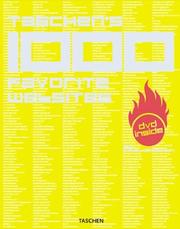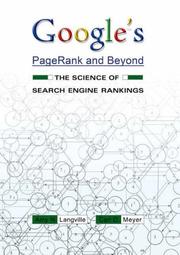| Listing 1 - 5 of 5 |
Sort by
|
Book
ISBN: 9783836519991 Year: 2010 Publisher: Cologne (Allemagne) : Taschen,
Abstract | Keywords | Export | Availability | Bookmark
 Loading...
Loading...Choose an application
- Reference Manager
- EndNote
- RefWorks (Direct export to RefWorks)
Une comparaison de sites Web efficaces, à travers 60 success stories. Répartis en 5 chapitres : le commerce en ligne, les sites Web d'entreprise, les campagnes, les médias sociaux et les sites promotionnels, l'ouvrage décrit les stratégies adoptées selon différents critères : rapidité, ambition et résultats.
webdesign --- Advertising. Public relations --- Computer architecture. Operating systems --- e-commerce --- online advertising --- Mass communications --- Web sites --- Internet marketing --- Internet advertising --- Sites Web --- Marketing sur Internet --- Publicite sur internet --- Design --- Conception

ISBN: 1412927676 1412927668 Year: 2006 Publisher: Thousand Oaks Corwin
Abstract | Keywords | Export | Availability | Bookmark
 Loading...
Loading...Choose an application
- Reference Manager
- EndNote
- RefWorks (Direct export to RefWorks)
Internet in education. --- Educational Web sites. --- Teaching --- Internet en éducation --- Sites Web éducatifs --- Enseignement --- Aids and devices. --- Matériel didactique --- 681.324 --- Digitale leermiddelen --- Social software --- Computer assisted instruction --- interactief onderwijs --- weblogs --- computerondersteund onderwijs --- e-learning --- Programmed instruction --- Internet en éducation --- Sites Web éducatifs --- Matériel didactique --- Educational Web sites --- Internet in education --- Curriculum materials --- Educational media --- Instructional materials --- Teaching materials --- Educational technology --- Media programs (Education) --- Internet (Computer network) in education --- Education --- Web sites --- Aids and devices --- 004.7
Book
ISBN: 9780321965516 0321965515 Year: 2013 Publisher: New Riders
Abstract | Keywords | Export | Availability | Bookmark
 Loading...
Loading...Choose an application
- Reference Manager
- EndNote
- RefWorks (Direct export to RefWorks)
Since Don?t Make Me Think was first published in 2000, hundreds of thousands of Web designers and developers have relied on usability guru Steve Krug?s guide to help them understand the principles of intuitive navigation and information design. Witty, commonsensical, and eminently practical, it?s one of the best-loved and most recommended books on the subject.Now Steve returns with fresh perspective to reexamine the principles that made Don?t Make Me Think a classic?with updated examples and a new chapter on mobile usability. And it?s still short, profusely illustrated?and best of all?fun to read.If you?ve read it before, you?ll rediscover what made Don?t Make Me Think so essential to Web designers and developers around the world. If you?ve never read it, you?ll see why so many people have said it should be required reading for anyone working on Web sites.?After reading it over a couple of hours and putting its ideas to work for the past five years, I can say it has done more to improve my abilities as a Web designer than any other book.??Jeffrey Zeldman, author of Designing with Web Standards .https://www.amazon.com/Dont-Make-Think-Revisited-Usability/dp/0321965515/ref=pd_lpo_1?pd_rd_i=0321965515&psc=1
Web sites --- Design. --- Evaluation. --- webdesign --- Computer architecture. Operating systems --- Usability --- Web Design --- Web development --- Mobile web development --- Web site development. --- Sites Web --- Conception --- Développement --- Evaluation --- 681.3 *C2 --- -Web site development --- 766.02 --- 791.5 --- web usability --- intranetdesign --- intranet --- grafisch ontwerp --- grafisch design --- internet --- grafische vormgeving --- websites --- Development of Web sites --- Internet programming --- 681.3 *C2 Computer communication networks: data communications; OSI; security and protection --- Computer communication networks: data communications; OSI; security and protection --- Pages, Web --- Sites, Web --- Web pages --- Websites --- World Wide Web pages --- World Wide Web sites --- WWW pages --- WWW sites --- Computer network resources --- Design --- Development --- 770.7 --- 528.52 --- interfaces --- user interfaces --- human-computer interaction --- computers --- computerprogramma's --- Interactive multimedia --- interaction design --- interactief design --- Hypermedia systems --- Interactive media --- Computer software --- interaction design, participatory design, social design --- internet - ontwerpen, programmeren en beheren van internetsites --- Zoekmachineoptimalisatie --- Gebruiksvriendelijkheid --- SEO --- Programmeren --- Webdesign --- Webdevelopment --- Consumentengedrag --- Consumentenpsychologie --- Gedrag --- Productontwikkeling --- Productinnovatie --- Human-centered design --- Gebruikerservaring --- Informatica --- Gebruikersonderzoek --- Programming

ISBN: 3822825867 4887832524 Year: 2003 Publisher: Keulen Taschen Verlag
Abstract | Keywords | Export | Availability | Bookmark
 Loading...
Loading...Choose an application
- Reference Manager
- EndNote
- RefWorks (Direct export to RefWorks)
2003
Web sites --- Art and technology --- Sites Web --- Art et technologie --- Directories. --- Répertoires --- 7.067.4 --- 681.3 *C2 --- 681.3 *C2 Computer communication networks: data communications; OSI; security and protection --- Computer communication networks: data communications; OSI; security and protection --- 7.067.4 Gebruiksaspect van de kunst: academische kunst; toegepaste kunst --- Gebruiksaspect van de kunst: academische kunst; toegepaste kunst --- Computergrafiek --- Internet --- Webdesign --- Computer architecture. Operating systems --- anno 2000-2009

ISBN: 0691122024 9780691122021 9780691152660 0691152667 9781400830329 140083032X Year: 2011 Publisher: Princeton, NJ
Abstract | Keywords | Export | Availability | Bookmark
 Loading...
Loading...Choose an application
- Reference Manager
- EndNote
- RefWorks (Direct export to RefWorks)
Why doesn't your home page appear on the first page of search results, even when you query your own name? How do other Web pages always appear at the top? What creates these powerful rankings? And how? The first book ever about the science of Web page rankings, Google's PageRank and Beyond supplies the answers to these and other questions and more. The book serves two very different audiences: the curious science reader and the technical computational reader. The chapters build in mathematical sophistication, so that the first five are accessible to the general academic reader. While other chapters are much more mathematical in nature, each one contains something for both audiences. For example, the authors include entertaining asides such as how search engines make money and how the Great Firewall of China influences research. The book includes an extensive background chapter designed to help readers learn more about the mathematics of search engines, and it contains several MATLAB codes and links to sample Web data sets. The philosophy throughout is to encourage readers to experiment with the ideas and algorithms in the text. -- Jacket.
Web search engines. --- Web sites --- Internet searching --- World Wide Web --- Ratings --- Mathematics. --- Subject access --- Information systems --- Pages, Web --- Sites, Web --- Web pages --- Websites --- World Wide Web pages --- World Wide Web sites --- WWW pages --- WWW sites --- Computer network resources --- W3 (World Wide Web) --- Web (World Wide Web) --- World Wide Web (Information retrieval system) --- WWW (World Wide Web) --- Hypertext systems --- Multimedia systems --- Internet --- Searching the Internet --- Web searching --- World Wide Web searching --- Electronic information resource searching --- Search engines --- Web portals --- Ratings and rankings --- Google. --- BackRub --- Web search engines --- Internet programming --- Moteurs de recherche sur Internet --- Programmation sur Internet --- 025.04 --- Google --- Mathematics --- Ratings and rankings&delete& --- Subject access&delete& --- IR (information retrieval) --- zoekmachines --- beoordeling --- Informatique --- Computer science --- Computer science. --- Web sites - Ratings - Mathematics. --- Internet searching - Mathematics. --- World Wide Web - Subject access - Mathematics. --- Web sites - Ratings and rankings - Mathematics --- Internet searching - Mathematics --- World Wide Web - Subject access - Mathematics --- Bases de donnees
| Listing 1 - 5 of 5 |
Sort by
|

 Search
Search Feedback
Feedback About UniCat
About UniCat  Help
Help News
News